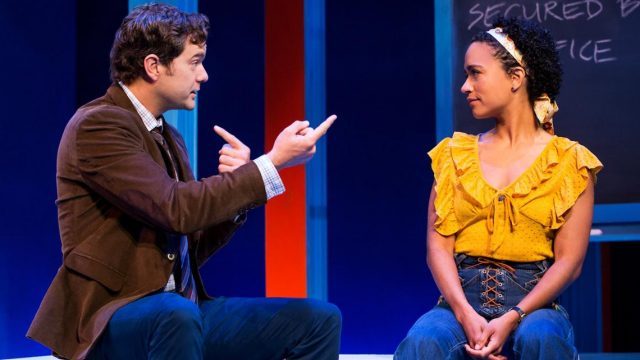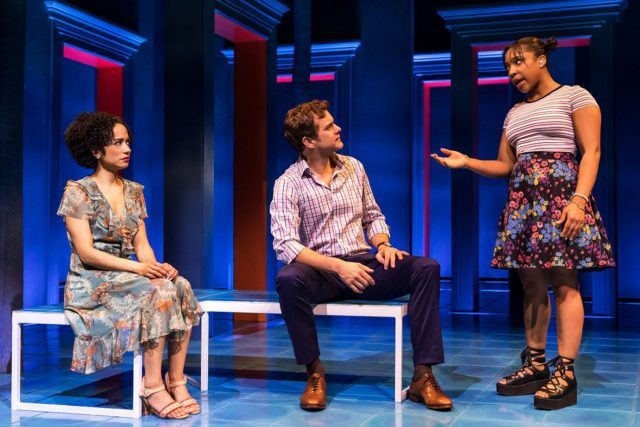
James Leeds (Joshua Jackson) and Sarah Norman (Lauren Ridloff) experience communications problems in Broadway revival of Children of a Lesser God (photo by Matthew Murphy)
Studio 54
254 West 54th St. between Seventh & Eighth Aves.
Tuesday – Sunday through May 27, $29-$159
www.childrenofalessergodbroadway.com
Every so often a previously successful play returns to Broadway in a revival that makes you wonder not only why it’s back but what the heck made it so special in the first place. Such is the case with Mark Medoff’s Children of a Lesser God, which just announced an early closing date of May 27 at Studio 54. Medoff wrote the play specifically for deaf actress Phyllis Frelich, loosely based on her real-life relationship with her husband, Robert Steinberg. The original 1980 production ran at the Longacre Theatre for more than two years and was nominated for four Tonys, winning Best Play, Best Actress (Frelich), and Best Actor (John Rubinstein). The British edition won the Olivier for Best New Play as well as Best Actress (Elizabeth Quinn) and Best Actor (Trevor Eve). And the 1986 film version was nominated for five Oscars, including Best Picture, and winning for Best Actress (Marlee Matlin). So went wrong this time around? Where should I begin?

There’s a whole lot of sitting around in ill-fated revival at Studio 54 (photo by Matthew Murphy)
Kenny Leon’s revival is stultifyingly dull — dare I say tone-deaf — as it explores the relationship between James Leeds (Drama League–nominated Joshua Jackson), a speech teacher at a school for the deaf, and Sarah Norman (Tony-nominated Lauren Ridloff), a twenty-six-year-old maid at the school who refuses to verbalize and fiercely rejects any attempt to help her do so. Sarah sees learning to speak as a betrayal of the nonhearing world she is proudly a part of, while James can’t understand why she wouldn’t want to speak or even use the latest technology that might allow her to at least pick up vibrations of sound. Very quickly, James falls for Sarah — well, it’s more like he stalks her — which upsets Sarah’s best friend, Orin (John McGinty), as well as the jealous Lydia (Treshelle Edmond), both students at the school. It also alarms the principal, Mr. Franklin (Anthony Edwards). In their Broadway debuts, Jackson (The Affair, Fringe) speaks too loudly and enunciates too clearly, never varying his speech pattern regardless of what he’s saying to whom, and Emmy winner Edwards speaks too softly, making it hard to hear much of what he has to say. All signed words are spoken out loud by the hearing actor being signed to, while all spoken words are shown in supertitles that are not always in sync with what is being said, often slightly ahead of the action. Whether all this is deliberate or not — Is the hearing world out of sync with the nonhearing? Does the experience of the hearing audience in such straits echo the experience of the nonhearing, faced with bad closed captions? — it just doesn’t work here. The sappy songs by Stevie Wonder and Wings don’t help, nor does Branford Marsalis’s tepid incidental music. It all feels more like a Hallmark Hall of Fame movie of the week than a Broadway production with lofty ticket prices. Tony, Obie, Drama Desk, and Emmy winner Derek McLane’s set consists of multiple open doorways that lead nowhere, least of all the exit. The title of the play comes from the “Passing of Arthur” section of Alfred, Lord Tennyson’s Idylls of the King, which now doubles as the passing of this well-meaning but hackneyed revival, after a mere 23 previews and, coincidentally enough, 54 regular performances at Studio 54.